语法一般将来时will讲解与练习图文稿
- 格式:docx
- 大小:22.36 KB
- 文档页数:6


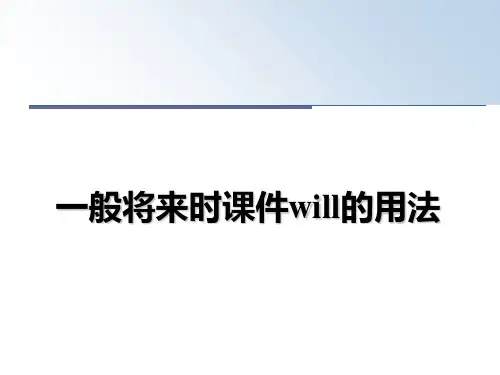
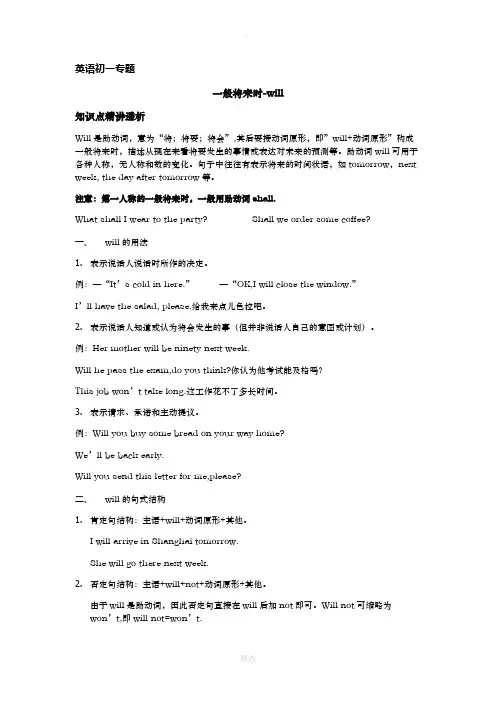
英语初一专题一般将来时-will知识点精讲透析Will是助动词,意为“将;将要;将会”,其后要接动词原形,即”will+动词原形”构成一般将来时,描述从现在来看将要发生的事情或表达对未来的预测等。
助动词will可用于各种人称,无人称和数的变化。
句子中往往有表示将来的时间状语,如tomorrow,next week, the day after tomorrow等。
注意:第一人称的一般将来时,一般用助动词shall.What shall I wear to the party? Shall we order some coffee?一、will的用法1.表示说话人说话时所作的决定。
例:—“It’s cold in here.”—“OK,I will close the window.”I’ll have the salad, please.给我来点儿色拉吧。
2.表示说话人知道或认为将会发生的事(但并非说话人自己的意图或计划)。
例:Her mother will be ninety next week.Will he pass the exam,do you think?你认为他考试能及格吗?This job won’t take long.这工作花不了多长时间。
3.表示请求、承诺和主动提议。
例:Will you buy some bread on your way home?We’ll be back early.Will you send this letter for me,please?二、will的句式结构1.肯定句结构:主语+will+动词原形+其他。
I will arrive in Shanghai tomorrow.She will go there next week.2.否定句结构:主语+will+not+动词原形+其他。
由于will是助动词,因此否定句直接在will后加not即可。

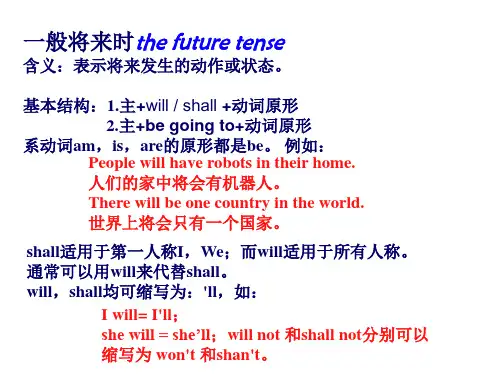

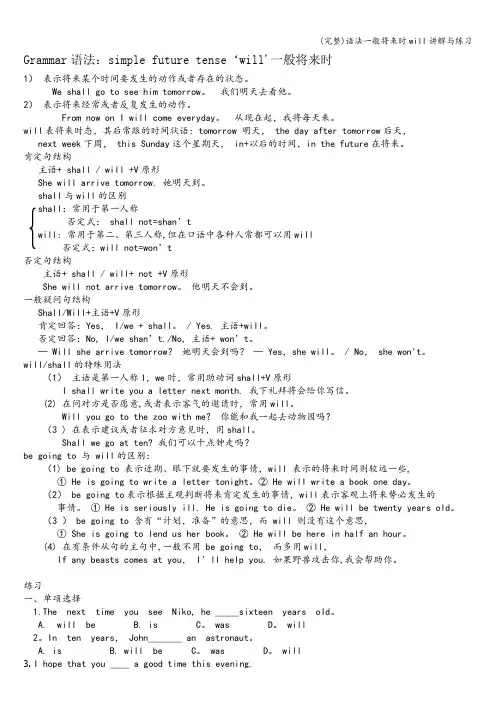
Grammar语法:simple future tense‘will'一般将来时1)表示将来某个时间要发生的动作或者存在的状态。
We shall go to see him tomorrow。
我们明天去看他。
2)表示将来经常或者反复发生的动作。
From now on I will come everyday。
从现在起,我将每天来。
will表将来时态,其后常跟的时间状语: tomorrow 明天, the day after tomorrow后天,next week下周, this Sunday这个星期天, in+以后的时间,in the future在将来。
肯定句结构主语+ shall / will +V原形She will arrive tomorrow. 她明天到。
shall与will的区别shall:常用于第一人称否定式:shall not=shan’twill: 常用于第二、第三人称,但在口语中各种人常都可以用will否定式:will not=won’t否定句结构主语+ shall / will+ not +V原形She will not arrive tomorrow。
他明天不会到。
一般疑问句结构Shall/Will+主语+V原形肯定回答:Yes, I/we + shall。
/ Yes. 主语+will。
否定回答:No, I/we shan’t./No, 主语+ won’t。
— Will she arrive tomorrow?她明天会到吗?— Yes,she will。
/ No, she won't。
will/shall的特殊用法(1)主语是第一人称I,we时,常用助动词shall+V原形I shall write you a letter next month. 我下礼拜将会给你写信。
(2) 在问对方是否愿意,或者表示客气的邀请时,常用will。
Will you go to the zoo with me?你能和我一起去动物园吗?(3 ) 在表示建议或者征求对方意见时,用shall。

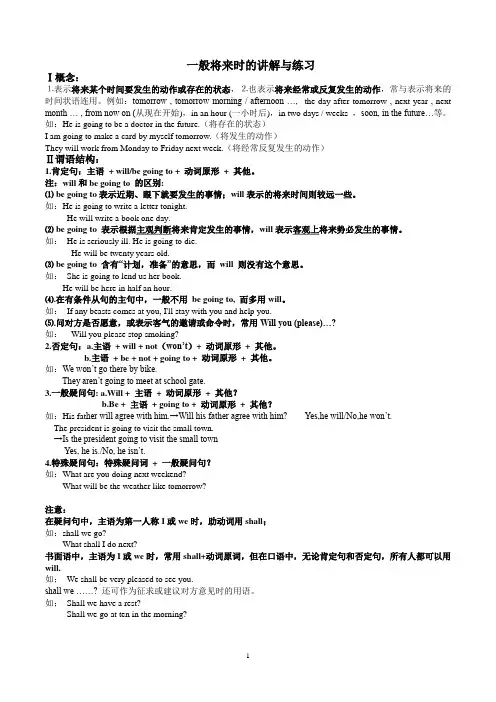
一般将来时的讲解与练习Ⅰ概念:⒈表示将来某个时间要发生的动作或存在的状态,⒉也表示将来经常或反复发生的动作,常与表示将来的时间状语连用。
例如:tomorrow , tomorrow morning / afternoon …,the day after tomorrow , next year , next month … , from now on (从现在开始),in an hour (一小时后),in two days / weeks ,soon, in the future…等。
如:He is going to be a doctor in the future.(将存在的状态)I am going to make a card by myself tomorrow.(将发生的动作)They will work from Monday to Friday next week.(将经常反复发生的动作)Ⅱ谓语结构:1.肯定句:主语+ will/be going to + 动词原形+ 其他。
注:will和be going to 的区别:⑴ be going to表示近期、眼下就要发生的事情;will表示的将来时间则较远一些。
如:He is going to write a letter tonight.He will write a book one day.⑵ be going to 表示根据主观判断将来肯定发生的事情,will表示客观上将来势必发生的事情。
如:He is seriously ill. He is going to die.He will be twenty years old.⑶ be going to 含有“计划,准备”的意思,而will 则没有这个意思。
如:She is going to lend us her book.He will be here in half an hour.⑷.在有条件从句的主句中,一般不用be going to, 而多用will。
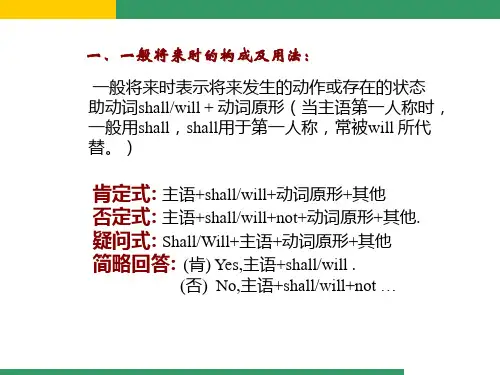
语法一般将来时will讲解与练习We are going to have a XXX.From now on。
I will exercise every day。
This means that I have made a XXX future.I will visit my parents next week。
This means that I have planned to visit them at a specific time in the future.She will not attend the party tonight。
This means that she has decided not to go to the party in the future.Will you help me with my homework。
This is a polite request for assistance in the future.XXX。
This is a n for a joint activity in the near future.XXX next month。
This means that I have XXX future.Will you please pass me the salt。
This is a polite request for an n to be taken in the present.I am going to buy a new car next week。
This means that I have made a XXX a car in the near future.XXX in two years。
This means that she is expected to graduate at a specific time in the future.A。
语法精讲:will表示(de)一般将来时(de)用法will是助动词,意为“将;将要;将会”,其后要接动词原形,即“will+动词原形”构成一般将来时,描述从现在来看将要发生(de)事情或表达对未来(de)预测等.助动词will可用于各种人称,无人称和数(de)变化.句子中往往有表示将来(de)时间状语,如tomorrow, next week, the day after tomorrow等.注意:第一人称(de)一般将来时,一般用助动词shall.What shall I wear to the partyShall we order some coffee一、 will(de)用法1. 表示说话人说话时所作(de)决定.例:—It’s cold in here. ―OK, I will close the window.I’ll have the salad, please. 给我来点儿色拉吧.2. 表示说话人知道或认为将会发生(de)事(但并非说话人自己(de)意图或计划).例:Her mother will be ninety next week.Will he pass the exam, do you think 你认为他考试能及格吗This job won’t take long.这工作花不了多长时间.3. 表示请求、承诺和主动提议.例:Will you buy some bread on your way home We’ll be back early. Will you send this letter for me, please二、 will(de)句式结构1. 肯定句结构:主语+will+动词原形+其他.I will arrive in Shanghai tomorrow. She will go there next week.2. 否定句结构:主语+will+not+动词原形+其他.由于will是助动词,因此否定句直接在will后加not即可.Will not可缩略为won’t,即will not=won’t.I won’t be able to come to dinner today. We won’t be busy thisevening.3. 一般疑问句结构:Will+主语+动词原形+其他will为助动词,变一般疑问句时,直接提到句首.She will be our English teacher next term.一般疑问句: Will she be your English teacher next term I will be a middle school student next year.一般疑问句:Will you be a middle school student next year4. 特殊疑问句结构:疑问词(组)+will+主语+动词原形+其他What will the future be like How will you finish your workI will arrive in Shanghai next week. (对划线部分提问)对Shanghai提问: Where will you arrive in next week对next week提问: When will you arrive in Shanghai课后练习:中考链接:1.—Which team do you think ________ the game—Hard to say. There are still ten minutes before it ends.A.wonB. has wonC. will winD. wins2. This term _______over. The summer vacation is coming in two weeks.A. isB. wasC. has beenD. will be 巩固练习用括号内(de)时间状语改写句子.1. I visit my grandparents.(next weekend)______________________________________________2. Does she speak English at the meeting (tomorrow)______________________________________________。
小学一般将来时讲解与练习Revised on November 25, 2020小学一般将来时一般将来时的定义:一般将来时表示在将来时间将要发生的动作或存在的状态,与表示将来的时间连用。
tomorrow,nextday(week,month,year…),soon,thedayaftertomorrow(后天)等。
(一)一般将来时有两种构成形式:be going to+动词原形=will +动词原形一、肯定句:1.主语+shall/will+动词原形+其它2.主语+be(am,is ,are)goingto+动词原形+其它I’m going to clean my bedroom tomorrow.二、否定句:主语+be (am,is,are)not going to +动词原形+其它主语+shall/will not +动词原形+其它 will not= won’tJim is not going to play football.Jim will not play football.三、一般疑问句:be (am/is/are)/will+主语+going to+动词原形+其它肯定回答: Yes,主语+will否定回答: No,主语+won’tIs Jim going to play football Yes, he will/ No, he won’tWill Jim going to play football四、疑问句:疑问词+be (am/is/are)动词+主语+going to+(动作)+( 其它)They are going to ride a bike.What are they going to doWhat is he going to doHe is going to ski.(二)、一般将来时的用法一.will用于所有人称,shall用于第一人称()二.will常简略为'll,并与主语连写在一起,如:I'll,he'll,it'll,we'll,you'll,they'll。
语法专题一般将来时1、定义:一般将来时表示将来某个时间要发生的动作或存在的状态2、结构:主语+will\shall\be going to+v(动词原形)+其他例如: It is going to rain. 要下雨了。
We are going to have a meeting today. 今天我们准备开一个会。
Tomorrow will be Sunday. 明天就是星期天。
The rain will stop soon. 雨很快就要停了。
I shall not go. 我不准备去了。
What shall we do for summer holiday?暑假我们做什么呢?注意:a.will用于所有人称,shall用于第一人称(we.I)b. will 常简略为 'll,并与主语连写在一起,如:I'll,he'll,it'll,we'll,you'll,they'll。
c. 一般疑问句如用will you…?其简略答语须是Yes,I will或 No,I won't;3、时间标志:常常和表示将来的时间状语连用。
如:tomorrow(明天), next week(下周),from now no(从现在开始),in the future(将来),soon, in 2015, in two days(两天之后)等。
四种句式:1. be going to +动词原形1)肯定句主语+be(am /,is,/ are) going to +动词原形+其它My sister is going to learn English next year. 我姐姐准备明年学英语。
2)否定句主语+be(am /,is,/ are) +not+ going to +动词原形+其它I am not going to(go to)the cinema tonight. 我今天晚上不打算去看电影。
语法一般将来时w i l l讲
解与练习
集团文件发布号:(9816-UATWW-MWUB-WUNN-INNUL-DQQTY-
Grammar语法:simple future tense‘will’一般将来时
1) 表示将来某个时间要发生的动作或者存在的状态。
We shall go to see him tomorrow. 我们明天去看他。
2) 表示将来经常或者反复发生的动作。
From now on I will come everyday. 从现在起,我将每天来。
will表将来时态,其后常跟的时间状语: tomorrow 明天, the day after tomorrow后天,
next week下周, this Sunday这个星期天, in+以后的时间,in the future在将来。
肯定句结构
主语+ shall / will +V原形
She will arrive tomorrow. 她明天到。
shall与will的区别
shall:常用于第一人称
否定式: shall not=shan’t
will: 常用于第二、第三人称,但在口语中各种人常都可以用will 否定式:will not=won’t
否定句结构
主语+ shall / will+ not +V原形
She will not arrive tomorrow. 他明天不会到。
一般疑问句结构
Shall/Will+主语+V原形
肯定回答:Yes, I/we + shall. / Yes. 主语+will.
否定回答:No, I/we shan’t./No, 主语+ won’t.
— Will she arrive tomorrow
她明天会到吗—Yes,she will. / No, she won’t.
will/shall的特殊用法
(1) 主语是第一人称I,we时,常用助动词shall+V原形
I shall write you a letter next month. 我下礼拜将会给你写信。
(2) 在问对方是否愿意,或者表示客气的邀请时,常用will.
Will you go to the zoo with me
你能和我一起去动物园吗
(3 ) 在表示建议或者征求对方意见时,用shall.
Shall we go at ten
我们可以十点钟走吗
be going to 与 will的区别:
(1) be going to 表示近期、眼下就要发生的事情,will 表示的将来时间则较远一些,
① He is going to write a letter tonight.② He will write a book one day.
(2) be going to表示根据主观判断将来肯定发生的事情,will表示客观上将来势必发生的
事情。
① He is seriously ill. He is going to die. ② He will be twenty years old.
(3 ) be going to 含有“计划,准备”的意思,而 will 则没有这个意思,
① She is going to lend us her book. ② He will be here in half an hour.
(4) 在有条件从句的主句中,一般不用 be going to, 而多用will, If any beasts comes at you, I'll help you. 如果野兽攻击你,我会帮助你。
练习
一、单项选择
1.ThenexttimeyouseeNiko, he _____sixteenyearsold.
A. willbe
B. is
C. was
D. will
2.Intenyears, John_______ anastronaut.
A. is
B. willbe
C. was
D. will
3.I hope that you ____ a good time this evening.
A. have
B. are having
C. will have
D. has
4.Look at those big black clouds. It ____ rain. Let’s hurry.
A. must
B. will
C. would
D. is going to
5.There ____ a basketball match this afternoon.
A. will have
B. will be
C. has
D. have
6.We ____ to the park if it is fine tomorrow.
A. will go
B. go
C. goes
D. to go
7.There _____ a kite show in the zoo tomorrow.
A. was
B. is going to have
C. will have
D. is going to be
8. Mother ______ me a nice present(礼物) on my next birthday.
A. will gives
B. will give
C. gives
D. give
二、用一般将来时填空。
(借助will)
1. I _________ (visit) my uncle tomorrow.
2. There _______ (be) a football match in our school next week.
3. He __________ (help) you with your English this evening.
4. We _________ (have) a meeting tomorrow.
三、按要求完成下列句子。
1. I will go to school by bike.(改为一般疑问句)
________________________________________
2.He will check his e-mails this afternoon.(改为否定句)
__________________________________________.
3.Li Ming and his friends will have a piano lesson. (改为一般疑问句并作肯定和否定回答)
__________________________________________ __________.
___________.
4.There will be some robots in our homes. (改为否定句) There _____ _____ _____ _____ robots in our homes.
5.Everyone will have a small car. (对划线部分提问)
______ ____everyone _____
四、用所给词的适当形式填空
1.______ (be) you free tomorrow?
2.What _____ you _______________ (do) tomorrow morning?
3.Hurry up! Or we _____ (be) late.。